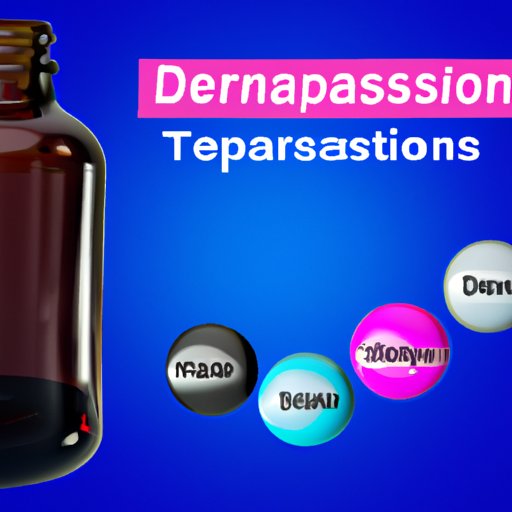Introduction
Many people are familiar with the term “depressant” but may not know what it truly means. In the world of drugs and substance abuse, depressants are one of the most prevalent types of drugs that can have serious consequences on individual’s health. Understanding what depressants are, how they work and their impact on the human body is vital if you want to make informed decisions about your well-being. This article provides a comprehensive guide to these central nervous system (CNS) depressants and their effects on the human body.
A Depressant: What it is and How it Affects Your Body and Mind
A depressant is any substance that is known to cause depression of the central nervous system, especially through slowing down brain activity and reducings tension. Depressants are different from other types of drugs such as stimulants that raise brain and CNS activity. They are commonly used for pain relief, sedation or anxiety relief. When a person uses depressants, chemical signals in the brain and CNS are disrupted, resulting in soothing and calming of the body. The effects of a depressant on the body and mind are both physical and mental.
Exploring the Effects of Depressants: Alcohol, Benzodiazepines, and Barbiturates
There are different types of depressants categorized according to their chemical structure, potency, and effects on the CNS. The most commonly abused depressants are alcohol, benzodiazepines, and barbiturates.
Alcohol: This is one of the most commonly consumed depressants worldwide. It is consumed in fast quantities leading to intoxication, loss of coordination, and impaired judgment. Alcohol affects the brain’s ability to identify dangers, make decisions and reduces inhibitions. Excessive alcohol consumption can cause brain damage, liver damage, and depression.
Benzodiazepines: These are a class of drugs commonly used to treat anxiety and insomnia. They can be extremely dangerous and addictive if misused, and can cause respiratory failure if overdosed. Long-term use of benzodiazepines can lead to depression, cognitive impairment, and even amnesia.
Barbiturates: These are a class of drugs that have been replaced by benzodiazepines because of higher risk and severe side effects. Used to treat anxiety, epilepsy and insomnia, Barbiturates causes a severe form of dependence with users encountering withdrawal symptoms if they stop abruptly.
Using Depressants: A Double-Edged Sword for Those Suffering from Anxiety and Insomnia
If used appropriately, depressants can be a lifesaver for people with anxiety or insomnia. However, any misuse or even overuse of these drugs can lead to addiction and other health risks. Misuse or overuse of depressants can result in dangerous side effects, such as addiction, withdrawal symptoms, respiratory problems, cardiovascular issues, seizures, and even death.
If you plan to use depressants for treating anxiety or insomnia, it is crucial that you consult your health care provider for proper guidance and dosages. Benzodiazepines like Valium, Klonopin, and Xanax should not be used regularly, and the body should not be dependent on them in the long-term. Alternative treatment options like behavioral therapy, meditation, and mindfulness training can help manage anxiety and insomnia and are also safe and long-lasting.
Depressants and their Impact on the Central Nervous System: A Comprehensive Guide
Depressants’ effects are widespread and can significantly impact physical and mental health. Once depressants enter the body, they attach to neurons that control neurotransmitters’ release in the brain. These chemicals can stimulate nerve cells in such a manner, leading to a decrease in anxiety, relaxation, and drowsiness. Most of these substances attach to the GABA receptor on the nerve cell, which results in neuron inhibition and decreased CNS activity. As a result, both the brain and body are slowed down, resulting in a calming and soothing effect on the user. However, long-term chronic use has been associated with the irreversible destruction of neurons in specific regions of the brain.
How Depressants Work on the Brain & Body: Understanding their Role in Addiction
Depressants can lead to physical and psychological addiction if not used appropriately or overused. The CNS and the brain adapt to regular depressant use and require more doses to achieve a calming effect, leading to addiction. Depressant use increases dopamine release, which is often referred to as the “reward system” of the brain. When the brain is exposed to these rewarding agents more often, it tries to adjust internal pathways to allow the same amount of pleasure from a lesser dose, leading to addiction.
The Risks and Benefits of Depressants: Navigating Their Use for Medicinal or Recreational Purposes
Whether for medical or recreational use, depressants present significant risks and benefits. People with anxiety or insomnia may find relief through prescribed depressants, which can help them function better. However, depressants can be addictive and risk long-term exposure. Regular users may lose their ability to function without depressants.
The recreational use of depressants is not advised. The brain and body experience multiple side effects that can significantly impact quality of life. And unfortunately, the risk of addiction is also significantly higher. Regular use of depressants like alcohol ultimately leads to a higher risk of heart and other organ damages, cancer as well as depression.
Conclusion
It is essential to understand what depressants are, how they work, and their effect on the body and mind, especially if you plan to use them for medicinal or recreational purposes. Depressants significantly impact the CNS and the body, and the risks involved with their use are high when misused or abused. Alternative medicinal treatments and natural methods are a safer bet than relying on depressants.
It is always best to consult with a health care provider before taking any medication and to follow a prescribed course of treatment closely. If you or someone you know is struggling with depression or addiction, do not hesitate to seek help.
